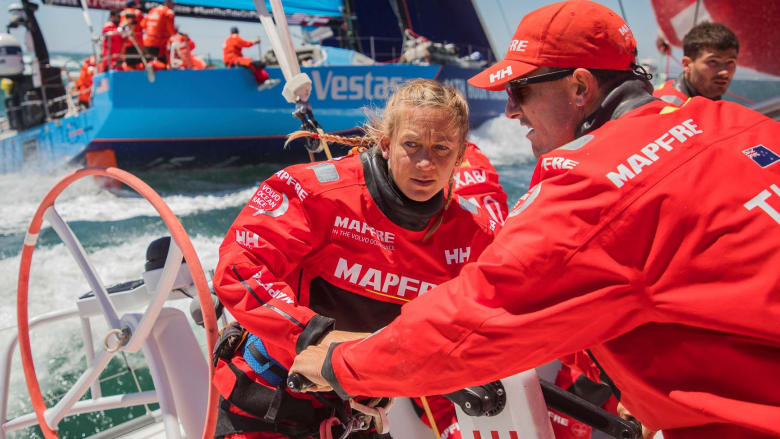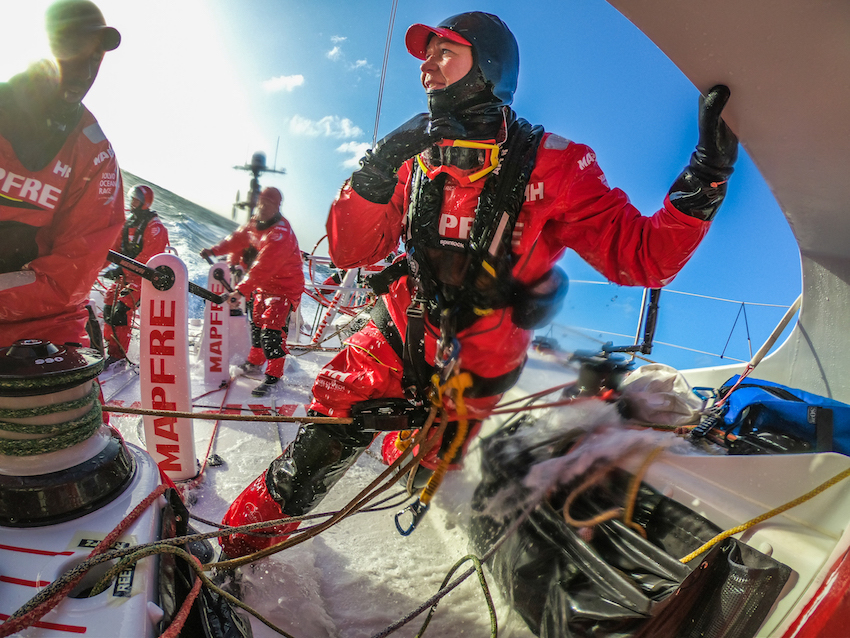Warrior spirit
Sophie Ciszek reveals how she thrives on relentless competitive pressure aboard MAPFRE in the Volvo Ocean Race.
Written by Scott Alle
Photography by Volvo Ocean Race
08 May 2018
Advertisement
Sophie Ciszek has one of the toughest jobs in sailing – full stop.
Doing bow on Volvo Ocean Race (VOR) leader MAPFRE, Ciszek is battling everything the Southern Ocean can muster on the 7,600-nautical-mile leg from Auckland, around Cape Horn, to Itajai in Brazil.
From Mornington near Melbourne, she is a driven, natural athlete whose physical attributes – 1.82 centimetres (six feet) tall, strong, and supremely fit – are matched by a resilience way beyond normal measures, and an ability to problem solve quickly under huge pressure.
Sails editor Scott Alle caught-up with this inspirational sailor just before she embarked on her latest challenge.
Advertisement
You’re about to head off on the longest and probably most demanding leg of the race, again much of it across the Southern Ocean. How have you and the team prepared?
We’re about halfway through the Volvo Ocean Race, so we’ve had a lot of time together and experienced sailing in all conditions. We know each other very well, and are prepared to face any challenge. The boat had a huge refit in New Zealand, making her ready to take on the Southern Ocean once again. We’ve had a nice break, and also worked hard on recovery and maintenance in the gym, as well as nutrition.
Leg 3 (Cape Town to Melbourne), was described by seasoned VOR veterans (four or five races) as brutal, and the toughest they’d done. How did you handle it?
It was very tough; relentless. The weather just did not let up. We had many sleepless watches pushing as hard as we could to win that leg and fight off Dongfeng. I handled it well, and thrive on that type of sailing. The adrenaline and tough conditions are where my endurance and ability to not give up really come through. My competitive edge wants to win and outdo the other teams.
Can you describe what goes through your head when you know a storm is looming and it’s going to be full-on?
I always prepare for the worst. I get as much information as I can, and prepare mentally for what the weather is going to be like. I also make sure I have my safety gear, and am ready for any situation. Mentally, if you’re ready for what could be 12 hours of 35 knots and you only have six hours, you’re always over prepared, but that’s better.
You have five Olympic medallists onboard MAPFRE, what’s the dynamic like on the boat? How is it different from the last time around on Team SCA? Gender, rightly, doesn’t seem to be an issue.
There’s a lot of experience on board – whether from high-level tactical sailing or the many different offshore races, Volvos as well as short-handed. There’s a lot of confidence on the boat; we’re always working on fine-tuning it to go as fast as we can – and win.
The competitive pressure out there is relentless, how do you deal with it, especially on the foredeck?
It’s the driving force that keeps us going, as is having the other boats so close, and also being one of the favourites in the race. The pressure is tough at times, but it’s also what makes me put in that extra energy and effort to be faster, especially on the bow – as long as it’s within reason, safe and no-one gets injured or washed off the boat.
You seem to thrive on the extreme challenges this races produces, why do you think that is?
It’s in my blood. The harder something is, the more I’ll try and the harder I’ll work. Sailing is in my family, and I’m a very determined and strong-minded person. This race is crazy. I thrive on being fit and strong, so when I can put that into practice along with the mental challenge, it’s the ultimate sporting event to be a part of, especially when I’m on a team that’s doing so well.
You’re a physical therapist, how would you rate the demands Volvo sailors put on bodies?
I’m a qualified clinical myotherapist (musculoskeletal therapist). We put a lot of pressure on our bodies physically, but even more so, the endurance and length of the event takes its toll. Nutrition, sleep deprivation and the mental challenges also make it a very taxing sport on the body. We also often get bumps, bruises and small injuries, and have to push through in order to keep competing, working as a team to get to the finish. Our bodies take a beating, but it shows how resilient the human body can be.
You have friends right through the fleet, but especially Liz Wardley and Dee Caffari on Turn the Tide on Plastic. Do you discuss getting another women’s campaign together?
We haven’t really talked about it, but it’s crossed my mind. Getting a good group of girls together, especially after the experience we will have gained after this race, would be great.
Has this race changed the way you perceive the ocean, and if so, how?
Not really. The ocean is the ocean and brings its challenges and beauty in all different ways in whatever the part of the world we are in, or the oceans we are crossing. The only perceptions that change are how you deal with it and the limits you can push to go faster and do well.
What other events are in your sailing plans?
At this stage, I am 100 per cent focussed on this race and doing well with my team, MAPFRE. What happens next, I’m not sure. Hopefully something exciting!
Advertisement
Advertisement
Advertisement




